Faith and Politics
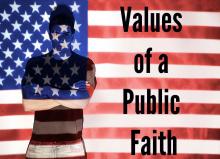
Editor's Note: This is part two of a three-part series from Dr. Miroslav Volf an a voice instructing us how to involve our values into our present politcal debates. To read part one go HERE. From part one:
In this year of presidential elections, I have decided to summarize key values that guide me as I decide for whom to cast my vote. ...
6. The Poor
Value: The poor — above all those without adequate food or shelter — deserve our special concern. (“The moral test of government is how it treats people in the dawn of life, the children, in the twilight of life, the aged, and in the shadows of life, the sick, the needy, and the handicapped” [Hubert Humphrey].)
Rationale: “When you reap the harvest of your land, you shall not reap to the very edges of your field, or gather the gleanings of your harvest; you shall leave them for the poor and for the alien: I am the LORD your God” (Lev. 23:22). “There will, however, be no one in need among you, because the LORD is sure to bless you in the land that the LORD your God is giving you as a possession to occupy” (Deut. 15:4).
Debate: There should be no debate whether fighting extreme poverty is a top priority of the government. That’s a given. We should debate the following: How should we generate a sense of solidarity with the poor among all citizens? In poverty alleviation, what is the proper role of governments and of individuals, religious communities, and civic organizations? What macroeconomic conditions most favor lifting people out of poverty? What should the minimum wage be?
Questions to Ask: Is overcoming extreme poverty (rather than fostering the wellbeing of the middle class) a priority for the candidate? For what poverty-reducing policies is the candidate prepared to fight?
Editor's Note: Sojourners has launched this new blog series to help shed light on the nation's latest "religious" affiliation. Go HERE to read their stories. Or EMAIL US to share your own.
PBS Religion & Ethics Newsweekly has launched a new mini-series on the rise of the unaffiliated. Go HERE to read more about this week's epidsode.
Watch None of the Above: Political Implications on PBS. See more from Religion & Ethics NewsWeekly.

Editor's Note: This is part one of a three-part series from Dr. Miroslav Volf an a voice instructing us how to involve our values into our present politcal debates.
In this year of presidential elections, I have decided to summarize key values that guide me as I decide for whom to cast my vote. There are three basic elements of choosing a candidate for public office responsibly:
- Values we hope the candidate will stand for and the order of priority among them (which requires of us knowledge of faith as a whole, rather than just a few favorite topics, and knowledge of how faith applies to contemporary life)
- Ways in which and means by which these values are best implemented in any given situation (which requires of us a great deal of knowledge about how the world actually functions and what policies lead to what outcomes — for instance, whether it would be an economically wise decision to try to reintroduce the gold standard)
- Capacity — ability and determination — to contribute to the implementation of these values (which requires of us knowledge of the track record of the candidate)
Most important are the values. As I identify each value, I will (1) name the basic content of the value, (2) give a basic rationale for holding it, (3) suggest some parameters of legitimate debate about it, and (4) identify a key question for the candidate.
I write as a Christian theologian, from the perspective of my own understanding of the Christian faith. Whole books have been written on each of these values, explicating and adjudicating complex debates. In providing a rationale for a given value, I only take one or two verses from the Bible to back up my position, more to flag the direction in which a rationale would need to go than, in fact, to strictly offer such a rationale.

Just peace theory begins with the idea that peacemaking, peacekeeping, and peace building is a day-by-blessed-day proposition. Unlike just war theory, it does not begin when violent conflict is imminent. There are 10 just peacemaking practices that have a record of success. A just peace foreign policy employs these practices for the purposes of both national security and of international peace.
The 10 just peacemaking practices are: support nonviolent direct action; take independent initiatives to reduce threat; use cooperative conflict resolution; acknowledge responsibility for conflict and injustice, and seek repentance and forgiveness; advance democracy, human rights, and interdependence; foster just and sustainable economic development; work with emerging cooperative forces in the international system; strengthen the United Nations and international efforts for cooperation and human rights; reduce offensive weapons and weapons trade; encourage grassroots peacemaking groups and voluntary association. (Just Peacemaking: the new paradigm for the ethics of peace and war Glen H. Stassen editor)
Cooperation, interdependence, human rights, and democracy are important elements of just peacemaking practices. I say this is a power-with, not a power-over model of foreign policy. This is not a model of weakness, but one of strength. The strength comes from building relationships and partnerships with other nations on the basis of mutual respect.
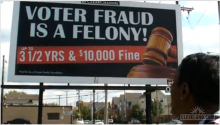
Fraud is a strong word. Webster's defines fraud as deceit and trickery, and an "intentional perversion of truth in order to induce another person to part with something of value or to surrender a legal right." Fraud is a serious matter.
The word "fraud" is on billboards around Ohio. I started noticing this a few weeks ago, when I was driving through a working class African American community in Cleveland and noticed a billboard that read: "Voter Fraud is a Felony: 3 1/2 years & $10,000 fine."
The red-and-black sign is accented by a large gavel in the lower right hand corner. A few days later, I noticed a similar billboard in Dayton, and late last week saw two such billboards near my home in urban Cincinnati. In an election season that has seen more jockeying around voter fraud and voter suppression than any in my memory, these billboards caught my eye.
Voter fraud sure sounds horrible, and based on these billboards in Ohio, one would imagine that it is an epidemic. After all, one of the hallmarks of American democracy is our fair and free elections.
But the billboards quickly created dissonance for me based on a recent meeting I and other pastors from Ohio Prophetic Voices enjoyed with Ohio Secretary of State John Husted. During the meeting, Husted told us that voter fraud is extremely rare and almost nonexistent. Statistics back up Husted's contention.
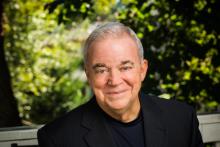
The Pew Forum recently released a new study, “Nones on the Rise.” This was not about my friends called the “Nuns On The Bus,” who just did a tour around the country focusing on social justice. Rather, It details the concerning trend of those in our country who have given up on religion altogether.
Social scientists tell us that adults, especially young adults, are increasingly disconnected from our established religious traditions. “Nones,” the Pew forum calls them, have grown from 15 percent of U.S. adults to 20 percent in only five years. One-in-three adults under 30 check the religious affiliation box, “None of the above” or “Unaffiliated.” Despite the fact that 68 percent of nones believe in God, only 5 percent of them attend church once or more a week, and 22 percent attend monthly/yearly. (Learn more about this group in our blog series Meet the Nones.)
But the focus on the next generation is not all bad news. On Tuesday, I had the pleasure of moderating a diverse panel of seven young evangelicals. Each had unique experiences and backgrounds. Some self-identified as liberal, while others self-identified as conservative. But those political ideologies could not separate their core evangelical principles.
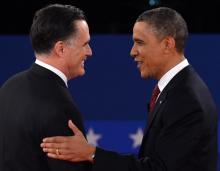
The presidential election is only weeks away… and it’s getting ugly out there. I mean … really ugly.
And before you think I’m just talking about the political process, the political parties, or the respective candidates, I was actually talking about you, me, us, and them … the people. And by people, I’m also especially talking about Christians.
Sometimes, I feel it would be appropriate to label how some Christians engage the presidential election season as “Christians Gone Wild."
Since there’s sure to be drama this week and next following the debates — and each day leading up to Election Day on Nov. 6, and likely some weeks afterward — I thought I’d share with you my 10 Commandments of the Election Season for Christians in hopes that it might speak some balance, sense, and perspective to any readers, not just during this election season but thereafter; not just in this country but in any country.
Why else am I sharing this?
Because I really want you to still respect yourself the morning after the election season.
Because I really want your friends to still respect you, too.
Know what I mean?
So, here are my 10 Commandments of the Election Season
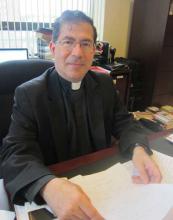
NEW YORK — A year ago, the Rev. Frank Pavone was facing an existential crisis in the unlikeliest of places.
The longtime head of the anti-abortion group Priests for Life, Pavone had been confined to the Diocese of Amarillo by his bishop, Patrick J. Zurek, who sent a letter to every other U.S. bishop declaring that he had so many concerns about the group’s $10 million budget that Pavone shouldn’t be trusted with donors’ money.
Pavone’s backers were stunned, and many stopped giving, which only exacerbated the problems that helped get Priests for Life into trouble in the first place. Pavone also couldn’t go on the road to reassure funders and drum up desperately needed cash.
Instead, the New York-born priest was stuck in a convent in the Texas panhandle where he served as chaplain to an order of nuns in a place called Prayer Town, a virtual prisoner in a war of words with Zurek, who had blasted his “incorrigible defiance of my legitimate authority as his bishop.”

The Billy Graham Evangelistic Association removed language labeling Mormonism a “cult” from its website after the famed preacher met with Republican nominee Mitt Romney last week and pledged to help his presidential campaign.
The removal came after a gay rights group reported that the “cult” reference remained online even after Graham all but endorsed Romney, a Mormon, on Oct. 11.
Ken Barun, the BGEA’s chief of staff, confirmed the removal on Tuesday.
“Our primary focus at the Billy Graham Evangelistic Association has always been promoting the Gospel of Jesus Christ,” Barun said in a statement. “We removed the information from the website because we do not wish to participate in a theological debate about something that has become politicized during this campaign.”
What culture war? At a survey release of young evangelicals and proceeding panel discussion, common ground was the pervading theme.
While panelists ranged in religious and political backgrounds — representing groups like Young Evangelicals for Climate Action, World Relief, Family Research Council, USAID, World Vision, the Manhattan Declaration, and Feed the Children — there was an overarching agreement that while young evangelicals are largely pro-life, life issues now extend to beyond the typical to things like creation care and immigration.
“There is still a lot of tension that many young people feel in trying to identify with one political party or the other,” Adam Taylor, vice president of advocacy for World Vision. “… There is a real deep commitment to a pro-life agenda, but that agenda has now expanded and includes a core and strong commitment to addressing issues of poverty.”

NEW DELHI — Political leaders in the tiny Buddhist nation of Bhutan have announced a nearly six-month ban on all public religious activities ahead of the upcoming elections, citing the Himalayan nation's constitution that says “religion shall remain above politics.”
A notification by the Election Commission of Bhutan asks people's "prayers and blessings" for the second parliamentary election, expected in June 2013. But it also states that religious institutions and clergy "shall not hold, conduct, organize or host" any public activity from Jan. 1 until the election.
The ban comes a year after the country's religious affairs ministry identified Buddhist and Hindu clergy who should be barred from voting to keep a clear distinction between religion and politics.

WASHINGTON — A coalition of evangelicals is calling on fellow Christians to support access to family planning across the world, saying it does not conflict with evangelical opposition to abortion.
The centrist New Evangelical Partnership for the Common Good released a 15-page document on Monday calling for “common ground” support of family planning and the health of mothers and children.
“We affirm that the use of contraceptives is a responsible and morally acceptable means to greater control over the number and timing of births, and to improve the overall developing and flourishing of women and children,” said the Rev. Jennifer Crumpton, one of the advisers to the evangelical group.
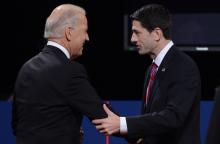
Catholicism’s social justice teachings have often been called the church’s “best-kept secret,” and after the Oct. 11 vice-presidential debate between Joe Biden and Paul Ryan – the first such showdown between the first two Catholics to oppose each other on a national ticket – that may still be the case.
While moderator Martha Raddatz earned kudos for her performance, her only question about the candidates’ shared Catholic faith came near the end of the 90-minute debate, and she framed it solely as a question of how their faith affects their policies on abortion rights.
That was seen as a victory for Catholic conservatives and Republicans who want to reinforce the image of the church as a “single-issue” religion – that issue being abortion – and a setback for liberal Democrats and others who have struggled to highlight the church’s teachings on the common good as central to Catholicism’s witness in the public square.
“What a lost opportunity!” wrote Michael O’Loughlin at the blog of America magazine, a national Jesuit weekly. “If the moderator planned to discuss faith, and I’m glad she did, why limit the discussion to one issue, however important, when the full spectrum of Catholic social teaching is ripe for an expansive and thought provoking conversation?”

It’s always annoyed me when people assume that, because I’m a Christian, I must also be socially conservative on all requisite issues. And while I understand those who lean further right because of their Christian beliefs, I take issue with those who suggest that being both a follower of Christ and a social progressive are mutually exclusive.
In fact, most of my positions on social issues can be traced back to my faith, which goes to show that the spectrum of beliefs taken from any given faith, as well as the many ways in which those beliefs are applied, is wide and arguably still growing as we continue to become increasingly pluralistic and intertwined.
Depending on your perspective, it could be argued that the landscape of presidential candidates either reflects such religious diversity, or that it’s still more of the same old majority rule at play, with a few minor cosmetic adjustments. For some, the fact that a Mormon is the Republican nominee is nothing short of astonishing, and what’s more, that the evangelical right is generally finding their way toward alignment with Mitt Romney’s presidential ticket.
It’s also worth noting that last week's vice presidential debate was the first time in history that we’ve had two Catholic VP nominees running against each other. The only fairly typical one in the group (unless you ask the Muslim conspiracy theorists, that is) is Barack Obama who is a member of the mainline protestant Christian denomination, the United Church of Christ.

Except for presidential candidates and some parts of the Bible Belt, the days when church membership was necessary for social acceptance are long gone. Many Americans view religion as suspect or superfluous or both.
In fact, the latest data from the Pew Forum on Religion & Public Life say that a record-high one in five Americans -- and one in three adults under age 30 -- are religiously unaffiliated.
So why did all 1,500 seats sell out for a debate I moderated a few months ago entitled “Has Science Refuted Religion?” at the California Institute of Technology? Why should the brilliant minds of the Caltech community even care, especially since skeptics, rather than true believers, made up the majority of the audience?
As the dean of a theology school, the question is of high interest to me, and I think I know the answer.

When we listen to political debates about which public policies will strengthen the economy, it is easy to get lost in a statistical maze. Each side presents economic data in a way that supports their own theory of the case.
The Congressional Research Service (CRS) is a branch of the Library of Congress that can help us make our own assessments regarding public policy. According to the CRS website, its purpose is to provide “authoritative, confidential, objective and nonpartisan” analyses to members of Congress.
The relationship between tax rates and the economy is an issue in the current campaign. Thinking about this issue, the CRS looks at empirical data that may or may not confirm theoretical models or ideological assumptions. Thus, like the early TV detective Joe Friday, they want “just the facts ma’am,” and then they try to reach conclusion from these facts.
A majority of Protestant pastors plan to vote for GOP presidential nominee Mitt Romney, according to a new survey, but nearly a quarter are still undecided less than a month from Election Day.
Just 17 percent of Protestant pastors said they would vote to re-elect President Obama, with 57 percent favoring Romney and 22 percent undecided, according to a survey conducted by LifeWay Research.
Based in Nashville, Tenn., the research firm is a branch of LifeWay Christian Resources.
The results are remarkably similar to a LifeWay survey conducted in October 2008, which found that 55 percent of Protestant pastors planned to vote for then-GOP nominee John McCain, 20 percent for Obama and 22 percent were undecided.
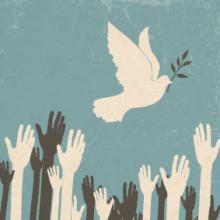
Several of my rabbi friends have explained to me that there are three Ds that we should keep in mind when we criticize the policies of the State of Israel as we work for justice and peace for Israelis and Palestinians. I think these three Ds can be helpful and can also be applied to the way that many people – including Christians and Jews – talk about Palestinians and the future Palestinian State.
The first D is Demonization. I have been told that demonization of the State of Israel occurs when it is called “a pariah nation,” compared to the Nazis, or accused of committing genocide. I agree that these references cheapen their meaning in their original context and are not helpful in pinpointing the exact policies that the State of Israel engages in that are harmful – like using tax revenue to subsidize housing for Israeli Jews in more than 120 settlements on land the Palestinians lay claim to for their future state.
The first D also applies to the ways U.S. citizens, Christians, and Jews demonize Palestinians. And just like it is never acceptable regarding Jews, Judaism, and the State of Israel, it is never acceptable regarding Palestinians, Palestinian Christians, Palestinian Muslims, Islam, and the future State of Palestine. This is most obvious in the widespread use of “terrorist” with no admission that violent extremists are a minority and that most Palestinians are hardworking people who want the best for their families and a healthy society to live in. An example of this demonization is Sacha Baron Cohen’s movie Bruno. Ayman Abu Aita, a Palestinian Christian who works for peace, was identified in the movie with the caption “Terrorist group leader.” Cohen lied to the Palestinian Christian and then for comedy purposes named him a terrorist. Abu Aita sued Cohen for defamation and they recently settled out of court.

What struck me as he spoke was the sheer human potential of this my client, wasted. That matters for all of us because of an unflinching Scriptural text about how we can enter the kingdom of God: “for I was hungry and you gave me food; I was thirsty and you gave me something to drink; I was a stranger and you welcomed me, I was sick and you took care of me. I was in prison and you visited me….just as you did it to the least of those who are members of my family, you did it to me.” (Matt. 25:35-40)
That’s the test. Not beliefs or intentions. Actions.
Specific actions: Jesus tells us to visit people considered the worst among us, those accused of breaking the law.
It’s not just innocent prisoners we are to see; it’s prisoners. They are all Jesus.
Editor's Note: Theologian extraordinnaire Tripp Hudgins put together this edition of First Thoughts prior to the first presidential debate. Still applicable before this evening's Vice Presidential debate.